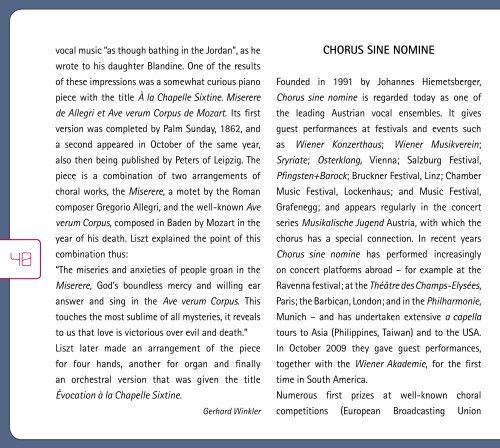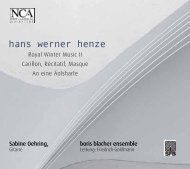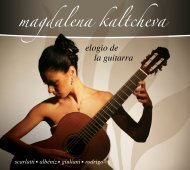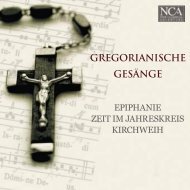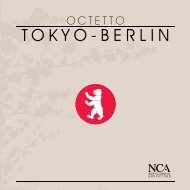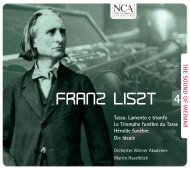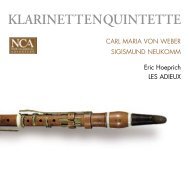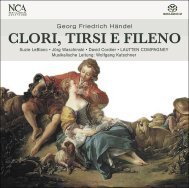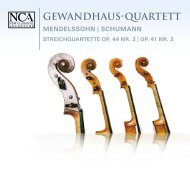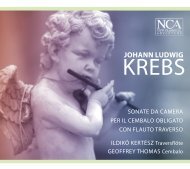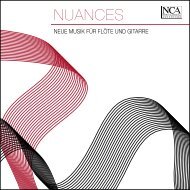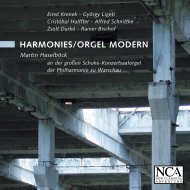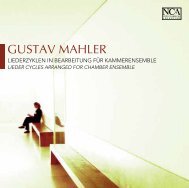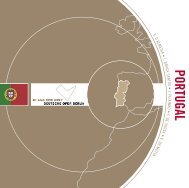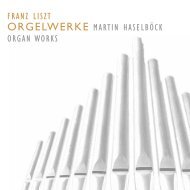FRANZ LISZT - nca - new classical adventure
FRANZ LISZT - nca - new classical adventure
FRANZ LISZT - nca - new classical adventure
Create successful ePaper yourself
Turn your PDF publications into a flip-book with our unique Google optimized e-Paper software.
vocal music “as though bathing in the Jordan”, as he<br />
wrote to his daughter Blandine. One of the results<br />
of these impressions was a somewhat curious piano<br />
piece with the title À la Chapelle Sixtine. Miserere<br />
de Allegri et Ave verum Corpus de Mozart. Its first<br />
version was completed by Palm Sunday, 1862, and<br />
a second appeared in October of the same year,<br />
also then being published by Peters of Leipzig. The<br />
piece is a combination of two arrangements of<br />
choral works, the Miserere, a motet by the Roman<br />
composer Gregorio Allegri, and the well-known Ave<br />
verum Corpus, composed in Baden by Mozart in the<br />
year of his death. Liszt explained the point of this<br />
combination thus:<br />
40 41<br />
“The miseries and anxieties of people groan in the<br />
Miserere, God’s boundless mercy and willing ear<br />
answer and sing in the Ave verum Corpus. This<br />
touches the most sublime of all mysteries, it reveals<br />
to us that love is victorious over evil and death.”<br />
Liszt later made an arrangement of the piece<br />
for four hands, another for organ and finally<br />
an orchestral version that was given the title<br />
Évocation à la Chapelle Sixtine.<br />
Gerhard Winkler<br />
CHORUS SINE NOMINE<br />
Founded in 1991 by Johannes Hiemetsberger,<br />
Chorus sine nomine is regarded today as one of<br />
the leading Austrian vocal ensembles. It gives<br />
guest performances at festivals and events such<br />
as Wiener Konzerthaus; Wiener Musikverein;<br />
Sryriate; Osterklang, Vienna; Salzburg Festival,<br />
Pfingsten+Barock; Bruckner Festival, Linz; Chamber<br />
Music Festival, Lockenhaus; and Music Festival,<br />
Grafenegg; and appears regularly in the concert<br />
series Musikalische Jugend Austria, with which the<br />
chorus has a special connection. In recent years<br />
Chorus sine nomine has performed increasingly<br />
on concert platforms abroad – for example at the<br />
Ravenna festival; at the Théâtre des Champs-Elysées,<br />
Paris; the Barbican, London; and in the Philharmonie,<br />
Munich – and has undertaken extensive a capella<br />
tours to Asia (Philippines, Taiwan) and to the USA.<br />
In October 2009 they gave guest performances,<br />
together with the Wiener Akademie, for the first<br />
time in South America.<br />
Numerous first prizes at well-known choral<br />
competitions (European Broadcasting Union<br />
competition “Let the Peoples Sing”, Choral<br />
competition at Spittal, Austria, Florilège Vocal de<br />
Tours) and also CD productions document the quality<br />
and significance of what is closest to the hearts of<br />
Chorus sine nomine, namely, their dedication to a<br />
capella music in all its rich diversity.<br />
Chorus sine nomine’s programme would be<br />
unthinkable without projects specially conceived<br />
and unconventional types of concerts such as<br />
CRY (2004), FROST (2007) or HAPPY BIRTHDAY<br />
(2009) and commissions awarded to contemporary<br />
composers, for instance recently to Wolfgang<br />
Sauseng (Johannespassion, Totentanz).<br />
Chorus sine Nomine<br />
Working with conductors such as Jordi Savall,<br />
Kristian Järvi, Martin Haselböck, H.K. Gruber, Gidon<br />
Kremer, Trevor Pinnock, Ulf Schirmer and orchestras<br />
such as the Camerata Salzburg, the Vienna Symphony<br />
Orchestra, the Vienna Radio Symphony Orchestra,<br />
L’Orfeo Barockorchester and the ensemble Sarband<br />
under Vladimir Ivanoff, Chorus sine nomine has<br />
realised a choral-orchestral programme enormous<br />
in its variety of styles; ranging from Emilio de<br />
Cavalieri’s Rappresentatione di Anima e di Corpo<br />
through the great choral works by Johann Sebastian<br />
Bach to Leonard Bernstein’s “Mass”; from Kurt<br />
Weill’s Mahagonny, Steve Reich’s “Desert Music”, to<br />
Sofia Gubaidulina’s Sonnengesang.<br />
english


